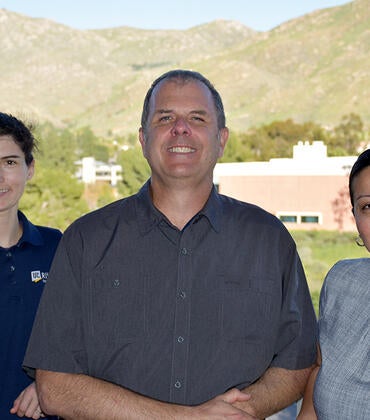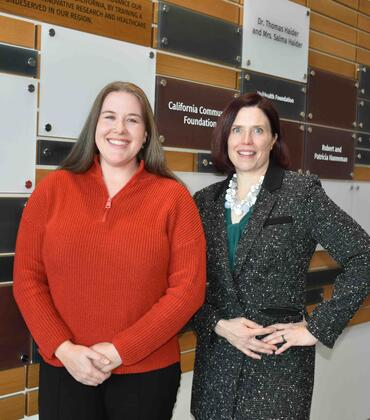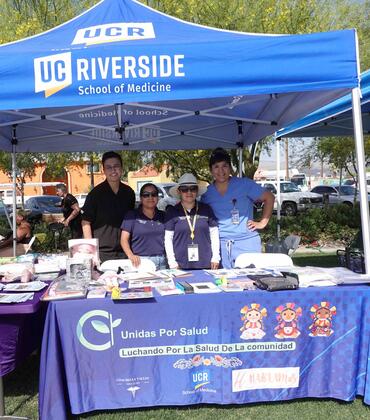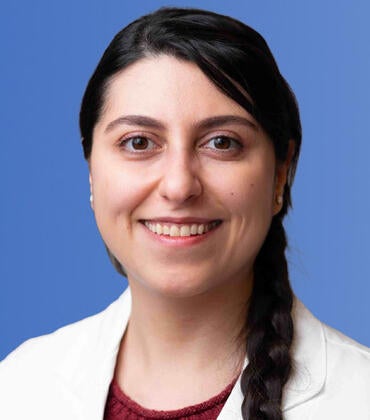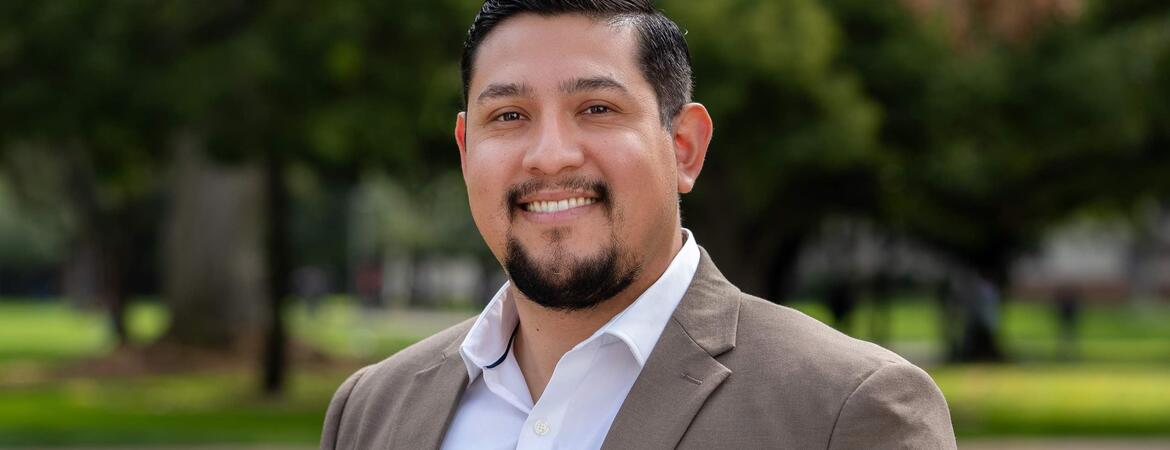
A few years ago, the UCR Health - La Quinta pediatrics clinic was just an idea on a piece of paper. For Steve Reyes, PhD, the strategic planning and project manager in the UCR School of Medicine Department of Strategic Initiatives, helping such ideas become reality is a favorite part of his job.
After joining the SOM in 2022, one of Reyes’ first projects involved working with then chief of staff Linda Reimann, Sasidharan Ponthenkandath, MD, professor and founding chair of the Pediatrics Department, and outside consulting partners to plan for the pediatrics clinic, including structuring its locations, operations, and finances. Although the clinic first opened in 2019, the COVID-19 pandemic in 2020 hindered its growth. However, with new planning and coordination efforts, the clinic soon met its goal of increasing access to pediatric care in the area. “When things are planned and then they actually work, that is about as good as it gets in my field,” Reyes said.
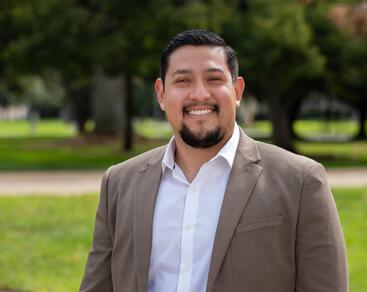
SOM employees’ work is driven by the school’s mission to improve healthcare in the region, but Reyes pointed out that their efforts are trackable to indicate the school’s exact impact on the community. He collaborates with each SOM department to create and regularly update their strategic plan to set goals and then, over time, show quantitative results. The pediatrics and psychiatry department most recently published their strategic plans, adding to the four others Reyes has contributed to since joining the SOM.
Reyes said he’s accustomed to skeptics questioning the value of strategic plans. “They’re like, ‘You're asking me for six months of my time… to write up what is often a 25-page plan with financials and operations, and then at the end of the day, what does it do?’” he explained.
Reyes has a ready answer. First, writing down a goal makes it more likely to happen, he pointed out. “Number two, once you develop a strategic plan, it is much more about tweaking and molding it, as opposed to coming up with new goals and initiatives each year,” Reyes continued. This approach lets departments establish and work toward longer term, more significant goals rather than pivoting to achieve new, smaller objectives every year. Finally, Reyes said, getting written goals approved can serve as justification for departmental budget requests and increase the requests’ likelihood of success. “We need to know how a request is going to contribute to the mission,” Reyes explained. “If you want a good budget, then you’d better have a good plan.”
Advising via insights and data
Reyes’ close collaboration with every SOM department gives him unique insights into the school as a whole to help develop goals and strategy. “I have touch points all the way from the dean to student assistants, and everything in between,” he said. Hearing a department’s objectives and vision from both the department chair and a medical education coordinator, for example, may offer Reyes different perspectives into the way a team’s efforts contribute to broader department initiatives, then help him identify places that could benefit from adjustments. “I really am a huge believer that you need to stay humble and talk to the people who are doing this work,” Reyes said. “Ultimately it’s going to remain confidential, but it's also an opportunity for me to go back to leadership and say, ‘I think we can do our approach a little differently.’”
Reyes also compiles and serves as the "source of truth" for SOM-produced data. While not a data analyst, his work includes student demographics, program evaluations, philanthropic data, clinical operations information, and more to identify successes and areas needing improvement–but it’s a big task. “One of the most complicated aspects of Steve’s job is herding all the different people together” for data requests, said Danny Teraguchi, EdD, executive associate dean for Student Affairs and the Salma Haider Endowed Chair for the Thomas Haider Program. “Imagine 10 different Pathway Programs, 10 years of admissions data, all on separate spreadsheets with different fields; you can just see the nightmare.”
The two recently collaborated on a tool to increase efficiency for collecting and presenting data. “We created this database where we can pull all our information so Steve can just look and pick what he wants,” Teraguchi explained. “It allowed us to create infographics to really tell the story through the data.”
Teraguchi added that Reyes has adopted the SOM’s mission as his personal one. “Sometimes when you're crunching data and you're distant from the students, that can feel like you're not contributing, but Steve sees the connection from what he's doing to really getting more physicians in our workforce,” Teraguchi said. “He has a tireless and unrelenting commitment to helping underserved communities achieve their dreams.”
Despite his knowledge of each department’s strategy and related data, along with personal connections that give him an insider’s perspective into each area, Reyes stopped short of saying that his position helps him guide the organization. “Steer the organization sounds like a way bigger role than I actually have,” he said with a laugh. “I would say I advise the organization and consult with the leadership to figure out what our best approach is.”
Here for the mission
Like many others at the SOM, Reyes took on his role in part because of the school’s mission. “The mission of the School of Medicine is to serve this region where I live and I grew up, so that was the first thing that attracted me to the position,” he said.
Beyond his efforts in guiding the SOM’s strategy to achieve the mission, Reyes also recently drew on his PhD in education policy to teach a narrative medicine course alongside Teraguchi. The course, which aimed to improve future physicians’ interactions with and understanding of their patients, connected Reyes with SOM students and reinforced the importance of the school’s mission.
For one student with a terminally ill mother, Reyes said the course helped the student channel his frustrations with the medical system that stemmed from his mother’s struggles to articulate her pain to her doctors and be understood in her non-native language. “Seeing him process that as somebody who will be a doctor, that was so powerful,” Reyes said. “If this student can take this perspective, as terrible and as traumatic as his experience has been, and it makes him the Superman of doctors, then that's what we're after.”
Appreciating the SOM’s administrators
Teaching up-and-coming physicians is vital at the SOM, but Reyes emphasized the importance of administrative efforts as well.
One example is Reyes’ Strategic Initiatives team itself, which he called the “glue” of the School of Medicine. “In mission-driven work, people sometimes forget about the details and the pieces that need to be put into place in order for the big thing to happen,” he said, citing the team’s role in putting on events like commencement, managing the SOM’s websites and communications, and completing a wide range of other responsibilities. “I think we're like pilots--if everything goes well, you don't know that we're there,” he explained. “It's only when things start to go bad that you're like, ‘Oh my gosh, we need the SI unit right now.’”
To recognize the many staff members who quietly contribute to the SOM’s success, Reyes helped develop the Clinical, Administrative, Research, and Education (CARE) Awards in 2022. “When I got to the School of Medicine, we had a million awards for faculty, and while they deserve it, we had 10 for staff,” Reyes recalled. He and Reimann worked together to elevate the awards and truly acknowledge staff members. “I'm super proud to say that in our first year we got over 80 nominations for the CARE Awards, and in our second year we got over 100,” he said.
Reyes said he hopes to keep teaching but also to continue his administrative role, perhaps as the dean of institutional research. “I want to do all the things that an academic would do, I just don't ever want to lose the perspective of a staff member, which I have been for my whole career,” he said.
For now, Reyes recently returned from paternity leave with a heightened appreciation for and commitment to medical education. After he and his wife, Magali, struggled to conceive for several years, Reyes said they were close to giving up until they decided to change insurance plans and begin fertility treatments with a UC physician. “I cannot say enough good things about the fertility team that we had, and within six months, we were successful,” said Reyes, who welcomed his daughter, Amelia Reyes, in May.
“That experience really reinforced to me again that I’ve got to be in medical education because I have this opportunity to prepare people who can ultimately do miracles,” Reyes added. “I think it's a good example of seeing the fruits of all the labor of the things that we do.”
